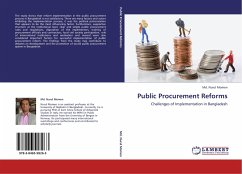The study shows that reform implementation in the public procurement process in Bangladesh is not satisfactory. There are many factors and actors inhibiting the implementation process, it was the political patronization that appears to be the most influencing factor. Furthermore, supportive structure at the institutional level, clear and simple public procurement rules and regulations, disposition of the implementers, training of procurement officials and contractors, local civil society participation, role of international institutions and motivation and reward were also considered important factors for successful implementation of public procurement reform. The findings from the study may contribute to debates on development and the promotion of sound public procurement system in Bangladesh.
Bitte wählen Sie Ihr Anliegen aus.
Rechnungen
Retourenschein anfordern
Bestellstatus
Storno








